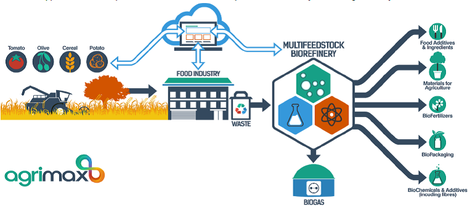BBI - AGRIMAX
cPPPs - BBI- AGRIMAX

Through the selection of case-scenarios previously developed to a pilot scale by the participating RTOs and their industrial transferability in high added-value applications, the project will disclose the holistic potential of 4 new agro-value chains. As can be observed in figure 1, the main expected bio-waste derived compounds will be demonstrated for applications as packaging materials, food additives, agricultural materials and biofertilisers, etc. but they have in fact potentials much beyond. Any by-product generated along the production cycle will be valorised in a cascade manner to reach over 40% of high value use of the bio-waste. This will lead to additional products such as active ingredients but also fibres, biogas and compost from the left biomass (the latter with the aim of being used in closed loop in the culture of the crops used in the project to prevent soil impoverishing). A techno-economic assessment, LCA and LCC will also study the best approach to minimize the environmental impact of the new value chains without jeopardizing the cost effectiveness of the multi-feedstocks biorefinery operations. The scaled up process will be validated in 2 demonstration sites in Spain and Italy with complementary feedstocks (residues and by products from the culture and processing of tomato, cereals, olives, potato). Last but not least, a platform for communication between the potential raw materials suppliers will be set up to maximise the use of the cooperative treatment system throughout the year.
The project will result in accessible processes and new products. The target is to divert significant amounts of selected AFPW from current low value use such as animal feed and low value compost, into applications with a 2-5 times greater value by applying a cascade approach. Along with the definition of business models to cooperatively operate multi-feedstock biorefinery plants that will allow providing sufficient supply for the target applications, all measures to maximise commercial potential including safety, consumer perception and regulatory aspects will be undertaken.
Objectives
- To map the available AFPW and their features
- To define the specifications for waste derived biocompounds and pilot processes
- To set up two flexible pilot plants for processing bio-wastes
- To use the delivered pilot plants to process AFPW into value added biocompounds
- To validate and demonstrate the use of derived biocompounds in packaging applications
- To validate and demonstrate the use of AFPW derived biocompounds in food applications
- To demonstrate the application of extracted biocompounds in nutraceuticals, active packaging, adhesives and coating applications
- To validate and demonstrate the use of AFPW derived biocompounds in agricultural applications
- To demonstrate the safety & regulatory compliance, as well as environmental & economic sustainability of the developed processes and products
- To implement a joint stakeholder platform for operating the cooperative processing plants
- To define sustainable value chains and propose suitable business models for the cooperative processing of AFPW
- To maximise the innovation impacts of the project for contributing to the uptake of the project results for growth and jobs
Role of Ghent University
UGent is mainly involved in Work package 6 “Validation and demonstration of agricultural wastes for agricultural applications”. This will include participation in following activities: to select the most suitable waste streams to produce fertilisers; to produce high-value solid and liquid fertilisers; to produce efficient fertilisers to improve crop yields and minimizing the environmental impact; to assess the impact of removing waste streams from agricultural production systems to check the absence of negative impact on the sustainability of the cultivation systems, including impacts on soils and suggesting the suitable compensation though the use of fertilisers from the project when needed. UGent is task leader of Task 6.3 “Soil assessment of crop cultivation with new waste valorisation approach”.
Contact
Prof. Stefaan De Neve
Department of Soil Management
Phone number: + 32 9 264 6061
E-mail: Stefaan.DeNeve@UGent.be